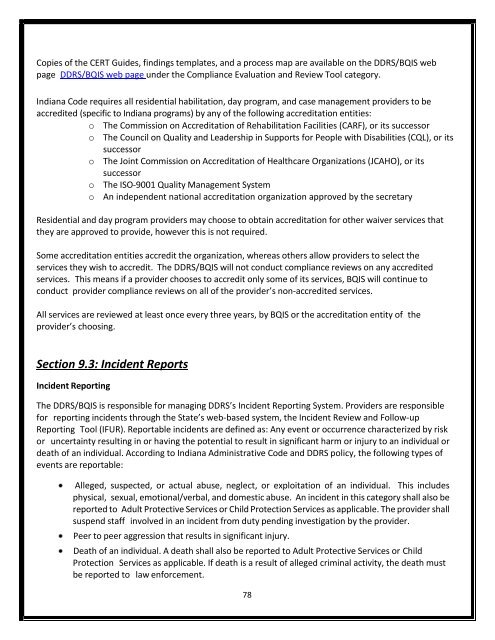DDRS Waiver Manual
2dXf5Pj
2dXf5Pj
You also want an ePaper? Increase the reach of your titles
YUMPU automatically turns print PDFs into web optimized ePapers that Google loves.
Copies of the CERT Guides, findings templates, and a process map are available on the <strong>DDRS</strong>/BQIS web<br />
page <strong>DDRS</strong>/BQIS web page under the Compliance Evaluation and Review Tool category.<br />
Indiana Code requires all residential habilitation, day program, and case management providers to be<br />
accredited (specific to Indiana programs) by any of the following accreditation entities:<br />
o The Commission on Accreditation of Rehabilitation Facilities (CARF), or its successor<br />
o The Council on Quality and Leadership in Supports for People with Disabilities (CQL), or its<br />
successor<br />
o The Joint Commission on Accreditation of Healthcare Organizations (JCAHO), or its<br />
successor<br />
o The ISO-9001 Quality Management System<br />
o An independent national accreditation organization approved by the secretary<br />
Residential and day program providers may choose to obtain accreditation for other waiver services that<br />
they are approved to provide, however this is not required.<br />
Some accreditation entities accredit the organization, whereas others allow providers to select the<br />
services they wish to accredit. The <strong>DDRS</strong>/BQIS will not conduct compliance reviews on any accredited<br />
services. This means if a provider chooses to accredit only some of its services, BQIS will continue to<br />
conduct provider compliance reviews on all of the provider’s non-accredited services.<br />
All services are reviewed at least once every three years, by BQIS or the accreditation entity of the<br />
provider’s choosing.<br />
Section 9.3: Incident Reports<br />
Incident Reporting<br />
The <strong>DDRS</strong>/BQIS is responsible for managing <strong>DDRS</strong>’s Incident Reporting System. Providers are responsible<br />
for reporting incidents through the State’s web-based system, the Incident Review and Follow-up<br />
Reporting Tool (IFUR). Reportable incidents are defined as: Any event or occurrence characterized by risk<br />
or uncertainty resulting in or having the potential to result in significant harm or injury to an individual or<br />
death of an individual. According to Indiana Administrative Code and <strong>DDRS</strong> policy, the following types of<br />
events are reportable:<br />
Alleged, suspected, or actual abuse, neglect, or exploitation of an individual. This includes<br />
physical, sexual, emotional/verbal, and domestic abuse. An incident in this category shall also be<br />
reported to Adult Protective Services or Child Protection Services as applicable. The provider shall<br />
suspend staff involved in an incident from duty pending investigation by the provider.<br />
Peer to peer aggression that results in significant injury.<br />
Death of an individual. A death shall also be reported to Adult Protective Services or Child<br />
Protection Services as applicable. If death is a result of alleged criminal activity, the death must<br />
be reported to law enforcement.<br />
78


